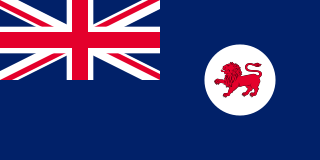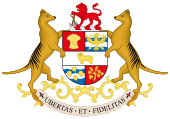
Tasmania is an island state of Australia. It is located 240 km (150 mi) to the south of the Australian mainland, separated by Bass Strait. The state encompasses the main island of Tasmania, the 26th-largest island in the world, and the surrounding 1000 islands. The state has a population of about 541,000 people as of September 2020. The state capital and largest city is Hobart, with around 40 percent of the population living in the Greater Hobart area.
Native title is the designation given to the common law doctrine of Aboriginal title in Australia, which is the recognition by Australian law that Indigenous Australians have rights and interests to their land that derive from their traditional laws and customs. The concept recognises that in certain cases there was and is a continued beneficial legal interest in land held by Indigenous peoples which survived the acquisition of radical title to the land by the Crown at the time of sovereignty. Native title can co-exist with non-Aboriginal proprietary rights and in some cases different Aboriginal groups can exercise their native title over the same land.

The second question of the 1967 Australian referendum of 27 May 1967, called by the Holt Government, related to Indigenous Australians. The question was in two parts: whether to give the Federal Government the power to make laws for Indigenous Australians in states, and whether in population counts for constitutional purposes to include all Indigenous Australians. The term "the Aboriginal Race" was used in the question.
Human rights in Australia have largely been developed under Australian Parliamentary democracy through laws in specific contexts and safeguarded by such institutions as the independent judiciary and the High Court, which implement common Law, the Australian Constitution, and various other laws of Australia and its states and territories. Australia also has an independent statutory human rights body, the Australian Human Rights Commission, which investigates and conciliates complaints, and more generally promotes human rights through education, discussion and reporting.
Henry Reynolds, is an Australian historian whose primary work has focused on the frontier conflict between European settlers in Australia and Indigenous Australians.

Aboriginal title is a common law doctrine that the land rights of indigenous peoples to customary tenure persist after the assumption of sovereignty under settler colonialism. The requirements of proof for the recognition of aboriginal title, the content of aboriginal title, the methods of extinguishing aboriginal title, and the availability of compensation in the case of extinguishment vary significantly by jurisdiction. Nearly all jurisdictions are in agreement that aboriginal title is inalienable, and that it may be held either individually or collectively.

The Anangu Pitjantjatjara Yankunytjatjara Land Rights Act 1981 grants certain land and other rights to the Anangu Pitjantjatjara Yankunytjatjara in South Australia. It began its life as the Pitjantjatjara Land Rights Act and commenced operation on 2 October 1981. Its long name title is "An Act to provide for the vesting of title to certain lands in the people known as Anangu Pitjantjatjara Yankunytjatjara; and for other purposes". The Act has since had several amendments, the latest in 2017.
Indigenous Australians are people with familial heritage to groups that lived in Australia before British colonisation. They include the Aboriginal and Torres Strait Islander peoples of Australia. The term Aboriginal and Torres Strait Islander peoples or the person's specific cultural group, is often preferred, though the terms First Nations of Australia, First Peoples of Australia and First Australians are also increasingly common.
Palawa kani is a constructed language created by the Tasmanian Aboriginal Centre as a composite Tasmanian language, based on reconstructed vocabulary from the limited accounts of the various languages once spoken by the eastern Aboriginal Tasmanians. The centre wishes to keep the language private until it is established in the community and claims copyright. However, languages cannot get copyright under Australian or international law.
Australian heritage laws exist at the national (Commonwealth) level, and at each of Australian Capital Territory, New South Wales, Northern Territory, Queensland, South Australia, Tasmania, Victoria, Western Australia state and territory levels. Generally there are separate laws governing Aboriginal cultural heritage and sacred sites, and historical heritage. State laws also allow heritage to be protected through local government regulations, such as planning schemes, as well.
Michael Alexander Mansell is a Tasmanian Aboriginal leader who, as an activist and lawyer, has worked for social, political and legal changes to improve the lives and social standing of Tasmanian Aboriginal (Palawa) people.

The Babel Island, part of the Babel Group within the Furneaux Group, is a 440-hectare (1,100-acre) granite island, located in Bass Strait, lying off the east coast of Flinders Island, Tasmania, south of Victoria, Australia. The privately owned island was named by Matthew Flinders from the noises made by the seabirds there.
Land councils, also known as Aboriginal land councils, or land and sea councils, are Australian community organisations, generally organised by region, that are commonly formed to represent the Indigenous Australians who occupied their particular region before the arrival of European settlers. They have historically advocated for recognition of traditional land rights, and also for the rights of Indigenous people in other areas such as equal wages and adequate housing. Land councils are self-supporting, and not funded by state or federal taxes.
The Aboriginal Land Rights Commission, also known as the Woodward Royal Commission, was a Royal Commission that existed from 1973 to 1974 with the purpose to inquire into appropriate ways to recognise Aboriginal land rights in the Northern Territory of Australia. The Commission was chaired by Justice Edward Woodward, who was appointed to the role by Gough Whitlam. It was not long after the 1971 defeat of the Yolgnu claimants in the Northern Territory Supreme Court, in Milirrpum v Nabalco Pty Ltd, in the first Aboriginal land rights case in Australia.
Suffrage in Australia refers to the right to vote for people living in Australia, including all its six component states and territories, as well as local councils. The colonies of Australia began to grant universal male suffrage to white men during the 1850s, with white women's suffrage following between the 1890s and 1900s. Today, the right to vote at federal, state and local levels of government is enjoyed by most citizens of Australia over the age of 18 years.
Commonwealth, State, and Territory Parliaments of Australia have passed Aboriginal land rights legislation.
Indigenous land rights in Australia, also known as Aboriginal land rights in Australia, relate to the rights and interests in land of Aboriginal and Torres Strait Islander people in Australia, and the term may also include the struggle for those rights. Connection to the land and waters is vital in Australian Aboriginal culture and to that of Torres Strait Islander people, and there has been a long battle to gain legal and moral recognition of ownership of the lands and waters occupied by the many peoples prior to colonisation of Australia starting in 1788, and the annexation of the Torres Strait Islands by the colony of Queensland in the 1870s.

Oyster Cove is a semi-rural locality in the local government areas (LGA) of Kingborough and Huon Valley in the Hobart and South-east LGA regions of Tasmania. The locality is about 20 kilometres (12 mi) south-west of the town of Kingston. The 2016 census has a population of 319 for the state suburb of Oyster Cove.
Indigenous treaties in Australia describe legal documents defining the relationship between Indigenous Australians and the Government of Australia or the government of an Australian state or territory. As of 2021 there are no such treaties in existence.
Aboriginal Australian identity, sometimes known as Aboriginality, is the perception of oneself as Aboriginal Australian, or the recognition by others of that identity. Aboriginal Australians are one of two Indigenous Australian groups of peoples, the other being Torres Strait Islanders. There has also been discussion about the use of "Indigenous" vs "Aboriginal", or more specific group names, such as Murri or Noongar (demonyms), Kaurna or Yolngu, based on language, or a clan name. Usually preference of the person(s) in question is used, if known.






